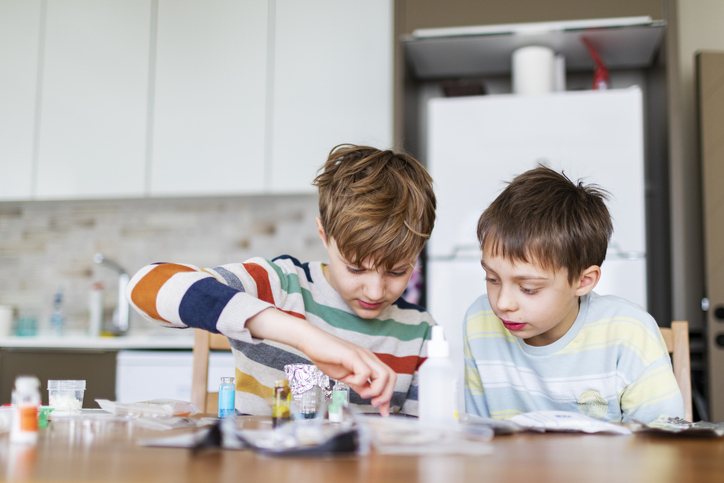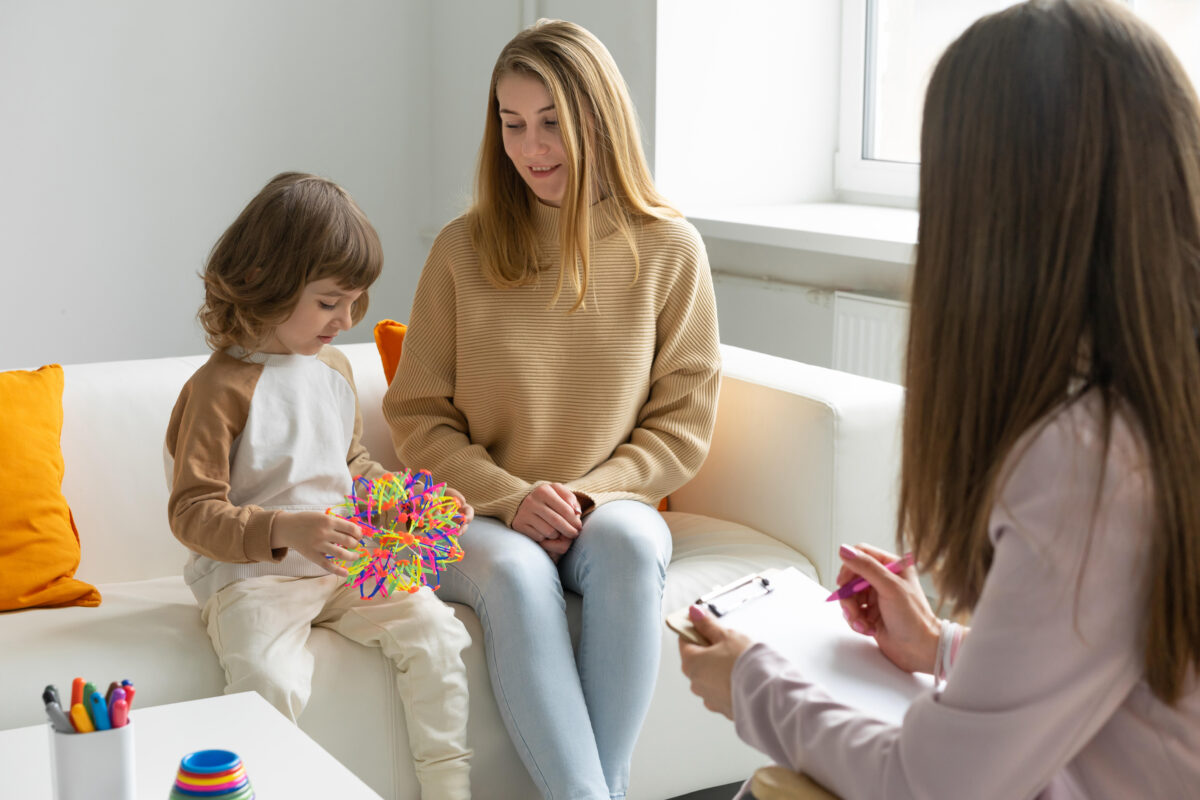Summertime brings a flurry of outdoor activities and a welcome break from school, but it can also be a challenging period for children who struggle with social interactions, especially those with autism. Navigating the social landscape of play dates requires a combination of sensitivity, preparation, and understanding from parents. Below are practical steps to ensure a positive and enriching experience for your child with autism when attending play dates:
Understand Your Child’s Preferences and Needs
Consider the activities your child most enjoys and what might cause discomfort or anxiety. Also consider the interests of their peers and look for common activities they both might enjoy. Whenever possible, tailor the play date activities to their shared interests to help both children feel comfortable and fully engaged.
Choose Playmates Thoughtfully
Selecting playmates who are understanding, patient, and willing to accommodate different ways of interacting can be crucial. It’s beneficial if the children already have a positive relationship, as this prior familiarity can make the interaction during the play date smoother and more enjoyable for both.
Plan Structured Activities
Children with autism often find comfort in predictability. Planning activities with clear beginnings and endings, such as board games, puzzles, or arts and crafts, can provide needed structure and help manage the flow of play. This organization makes the environment less chaotic for your child, facilitating a smoother experience.
Create a Calm and Safe Environment
Ensure that the play area is conducive to your child’s needs. Set up a quiet space where they can retreat if they feel overwhelmed, and minimize sensory distractions like loud noises or bright lights, unless these are stimuli that your child enjoys.
Communicate with the Other Parents
If you are comfortable, share details about your child’s likes, dislikes, and effective communication strategies with the other parents. This transparency can foster a supportive environment and enhance understanding among both children and adults involved.
Utilize Visual Supports
Visual aids such as schedules, picture cards, or social stories can be very helpful. They assist all children in understanding what to expect and how to interact respectfully and appropriately during the play date.
Offer Gentle Guidance
Provide simple prompts or suggestions to help navigate interactions between the children. It’s important to respect each child’s pace and comfort level while facilitating their engagement with each other.
Encourage and Acknowledge Efforts
It’s vital to recognize and celebrate the efforts of all children involved. Whether it’s through verbal praise, smiles, or another form of positive reinforcement, acknowledgment can create a nurturing atmosphere and encourage further social interaction.
Be Patient and Flexible
Remember that play dates might not always go as planned. Being flexible and patient allows the children the necessary time to adjust to each other. Intervene when necessary to maintain safety and ensure positive interactions.
Reflect and Adjust
After the play date, take some time to reflect on what worked well and what could be improved. This evaluation will help you better plan future activities, introducing new elements or interactions based on the children’s responses and comfort levels.
Foster Ongoing Communication
Encourage ongoing dialogue between your child and their playmates. This continuous communication can help build a stronger bond and more effective interaction in future gatherings.
Promote Independence
Gradually encourage your child to make decisions during play dates, such as choosing games or leading activities. This fosters independence and confidence.
Approaching play dates with sensitivity and a deep understanding of each child’s unique needs and strengths can foster meaningful social connections and enjoyable experiences for children with autism and their peers. A thoughtful approach can make a significant difference in creating inclusive and supportive play dates including opportunities for your child to build social skills and develop friendships with their peers.
Selecting playmates who are understanding, patient, and willing to accommodate different ways of interacting can be crucial. It’s beneficial if the children already have a positive relationship, as this prior familiarity can make the interaction during the play date smoother and more enjoyable for both.
Plan Structured Activities
Children with autism often find comfort in predictability. Planning activities with clear beginnings and endings, such as board games, puzzles, or arts and crafts, can provide needed structure and help manage the flow of play. This organization makes the environment less chaotic for your child, facilitating a smoother experience.
Create a Calm and Safe Environment
Ensure that the play area is conducive to your child’s needs. Set up a quiet space where they can retreat if they feel overwhelmed, and minimize sensory distractions like loud noises or bright lights, unless these are stimuli that your child enjoys.
Communicate with the Other Parents
If you are comfortable, share details about your child’s likes, dislikes, and effective communication strategies with the other parents. This transparency can foster a supportive environment and enhance understanding among both children and adults involved.
Utilize Visual Supports
Visual aids such as schedules, picture cards, or social stories can be very helpful. They assist all children in understanding what to expect and how to interact respectfully and appropriately during the play date.
Offer Gentle Guidance
Provide simple prompts or suggestions to help navigate interactions between the children. It’s important to respect each child’s pace and comfort level while facilitating their engagement with each other.
Encourage and Acknowledge Efforts
It’s vital to recognize and celebrate the efforts of all children involved. Whether it’s through verbal praise, smiles, or another form of positive reinforcement, acknowledgment can create a nurturing atmosphere and encourage further social interaction.
Be Patient and Flexible
Remember that play dates might not always go as planned. Being flexible and patient allows the children the necessary time to adjust to each other. Intervene when necessary to maintain safety and ensure positive interactions.
Reflect and Adjust
After the play date, take some time to reflect on what worked well and what could be improved. This evaluation will help you better plan future activities, introducing new elements or interactions based on the children’s responses and comfort levels.
Foster Ongoing Communication
Encourage ongoing dialogue between your child and their playmates. This continuous communication can help build a stronger bond and more effective interaction in future gatherings.
Promote Independence
Gradually encourage your child to make decisions during play dates, such as choosing games or leading activities. This fosters independence and confidence.
Approaching play dates with sensitivity and a deep understanding of each child’s unique needs and strengths can foster meaningful social connections and enjoyable experiences for children with autism and their peers. A thoughtful approach can make a significant difference in creating inclusive and supportive play dates including opportunities for your child to build social skills and develop friendships with their peers.
Ensure that the play area is conducive to your child’s needs. Set up a quiet space where they can retreat if they feel overwhelmed, and minimize sensory distractions like loud noises or bright lights, unless these are stimuli that your child enjoys.
Communicate with the Other Parents
If you are comfortable, share details about your child’s likes, dislikes, and effective communication strategies with the other parents. This transparency can foster a supportive environment and enhance understanding among both children and adults involved.
Utilize Visual Supports
Visual aids such as schedules, picture cards, or social stories can be very helpful. They assist all children in understanding what to expect and how to interact respectfully and appropriately during the play date.
Offer Gentle Guidance
Provide simple prompts or suggestions to help navigate interactions between the children. It’s important to respect each child’s pace and comfort level while facilitating their engagement with each other.
Encourage and Acknowledge Efforts
It’s vital to recognize and celebrate the efforts of all children involved. Whether it’s through verbal praise, smiles, or another form of positive reinforcement, acknowledgment can create a nurturing atmosphere and encourage further social interaction.
Be Patient and Flexible
Remember that play dates might not always go as planned. Being flexible and patient allows the children the necessary time to adjust to each other. Intervene when necessary to maintain safety and ensure positive interactions.
Reflect and Adjust
After the play date, take some time to reflect on what worked well and what could be improved. This evaluation will help you better plan future activities, introducing new elements or interactions based on the children’s responses and comfort levels.
Foster Ongoing Communication
Encourage ongoing dialogue between your child and their playmates. This continuous communication can help build a stronger bond and more effective interaction in future gatherings.
Promote Independence
Gradually encourage your child to make decisions during play dates, such as choosing games or leading activities. This fosters independence and confidence.
Approaching play dates with sensitivity and a deep understanding of each child’s unique needs and strengths can foster meaningful social connections and enjoyable experiences for children with autism and their peers. A thoughtful approach can make a significant difference in creating inclusive and supportive play dates including opportunities for your child to build social skills and develop friendships with their peers.
Visual aids such as schedules, picture cards, or social stories can be very helpful. They assist all children in understanding what to expect and how to interact respectfully and appropriately during the play date.
Offer Gentle Guidance
Provide simple prompts or suggestions to help navigate interactions between the children. It’s important to respect each child’s pace and comfort level while facilitating their engagement with each other.
Encourage and Acknowledge Efforts
It’s vital to recognize and celebrate the efforts of all children involved. Whether it’s through verbal praise, smiles, or another form of positive reinforcement, acknowledgment can create a nurturing atmosphere and encourage further social interaction.
Be Patient and Flexible
Remember that play dates might not always go as planned. Being flexible and patient allows the children the necessary time to adjust to each other. Intervene when necessary to maintain safety and ensure positive interactions.
Reflect and Adjust
After the play date, take some time to reflect on what worked well and what could be improved. This evaluation will help you better plan future activities, introducing new elements or interactions based on the children’s responses and comfort levels.
Foster Ongoing Communication
Encourage ongoing dialogue between your child and their playmates. This continuous communication can help build a stronger bond and more effective interaction in future gatherings.
Promote Independence
Gradually encourage your child to make decisions during play dates, such as choosing games or leading activities. This fosters independence and confidence.
Approaching play dates with sensitivity and a deep understanding of each child’s unique needs and strengths can foster meaningful social connections and enjoyable experiences for children with autism and their peers. A thoughtful approach can make a significant difference in creating inclusive and supportive play dates including opportunities for your child to build social skills and develop friendships with their peers.
It’s vital to recognize and celebrate the efforts of all children involved. Whether it’s through verbal praise, smiles, or another form of positive reinforcement, acknowledgment can create a nurturing atmosphere and encourage further social interaction.
Be Patient and Flexible
Remember that play dates might not always go as planned. Being flexible and patient allows the children the necessary time to adjust to each other. Intervene when necessary to maintain safety and ensure positive interactions.
Reflect and Adjust
After the play date, take some time to reflect on what worked well and what could be improved. This evaluation will help you better plan future activities, introducing new elements or interactions based on the children’s responses and comfort levels.
Foster Ongoing Communication
Encourage ongoing dialogue between your child and their playmates. This continuous communication can help build a stronger bond and more effective interaction in future gatherings.
Promote Independence
Gradually encourage your child to make decisions during play dates, such as choosing games or leading activities. This fosters independence and confidence.
Approaching play dates with sensitivity and a deep understanding of each child’s unique needs and strengths can foster meaningful social connections and enjoyable experiences for children with autism and their peers. A thoughtful approach can make a significant difference in creating inclusive and supportive play dates including opportunities for your child to build social skills and develop friendships with their peers.
After the play date, take some time to reflect on what worked well and what could be improved. This evaluation will help you better plan future activities, introducing new elements or interactions based on the children’s responses and comfort levels.
Foster Ongoing Communication
Encourage ongoing dialogue between your child and their playmates. This continuous communication can help build a stronger bond and more effective interaction in future gatherings.
Promote Independence
Gradually encourage your child to make decisions during play dates, such as choosing games or leading activities. This fosters independence and confidence.
Approaching play dates with sensitivity and a deep understanding of each child’s unique needs and strengths can foster meaningful social connections and enjoyable experiences for children with autism and their peers. A thoughtful approach can make a significant difference in creating inclusive and supportive play dates including opportunities for your child to build social skills and develop friendships with their peers.
Gradually encourage your child to make decisions during play dates, such as choosing games or leading activities. This fosters independence and confidence.
Approaching play dates with sensitivity and a deep understanding of each child’s unique needs and strengths can foster meaningful social connections and enjoyable experiences for children with autism and their peers. A thoughtful approach can make a significant difference in creating inclusive and supportive play dates including opportunities for your child to build social skills and develop friendships with their peers.



